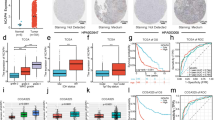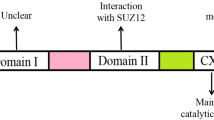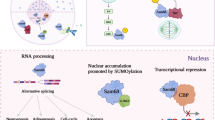Abstract
S-Phase kinase associated protein (Skp) 2 is an F-box protein required for substrate recognition of the SCFSkp2 ubiquitin ligase complex. Skp2 is often overexpressed in transformed cells and in various types of tumors. Downregulation or inhibition of Skp2 inhibits growth of breast cancer cells and small-cell lung carcinoma cells. We downregulated Skp2 in T98G glioblastoma cells using small interfering RNA (siRNA). Downregulation induced p27 and caused growth arrest and apoptosis. Downregulation of both Skp2 and p27 increased apoptosis synergistically. Cyclin E levels and cyclin E-CDK2 kinase activity increased dramatically when both Skp2 and p27 were downregulated. Coincidently, Bcl-2 but not Bcl-xL expression decreased, and caspase-3 was activated. Inhibition of cyclin E-CDK2 kinase activity by forced expression of p21 reversed these effects. Moreover, stable expression of Bcl-2 also abrogated apoptosis induced by downregulation of Skp2 and p27. We suggest that Skp2 in tumor cells suppresses apoptosis through Bcl-2 expression, potentially through regulation of cyclin E-CDK2 activity.








Similar content being viewed by others
Abbreviations
- Br-dU :
-
5-Bromo-2-deoxyuridine
- CDK :
-
Cyclin-dependent kinase
- CMV :
-
Cytomegalovirus
- DTT :
-
Dithiothreitol
- FBS :
-
Fetal bovine serum
- GFP :
-
Green fluorescent protein
- PAGE :
-
Polyacrylamide gel electrophoresis
- PI :
-
Propidium iodide
- SDS :
-
Sodium dodecyl sulfate
- siRNA :
-
Small interfering RNA
- Skp :
-
S-phase kinase associated protein
References
Zhang H, Kobayashi R, Galaktionov K, Beach D (1995) p19Skp1 and p45Skp2 are essential elements of the cyclin A-CDK2 S phase kinase. Cell 82:915–925
Lisztwan J, Marti A, Sutterluty H, Gstaiger M, Wirbelauer C, Krek W (1998) Association of human CUL-1 and ubiquitin-conjugating enzyme CDC34 with the F-box protein p45 (SKP2): evidence for evolutionary conservation in the subunit composition of the CDC34-SCF pathway. EMBO J 17:368–383
Harper JW (2001) Protein destruction: adapting roles for Cks proteins. Curr Biol 11:R431–435
Carrano AC, Eytan E, Hershko A, Pagano M (1999) SKP2 is required for ubiquitin-mediated degradation of the CDK inhibitor p27. Nat Cell Biol 1:193–199
Bornstein G, Bloom J, Sitry-Shevah D, Nakayama K, Pagano M, Hershko A (2003) Role of the SCFSkp2 ubiquitin ligase in the degradation of p21Cip1 in S phase. J Biol Chem 278:25752–25757
Tedesco D, Lukas J, Reed SI (2002) The pRb-related protein p130 is regulated by phosphorylation-dependent proteolysis via the protein-ubiquitin ligase SCF (Skp2). Genes Dev 16:2946–2957
Marti A, Wirbelauer C, Scheffner M, Krek W (1999) Interaction between ubiquitin-protein ligase SCFSKP2 and E2F-1 underlies the regulation of E2F-1 degradation. Nat Cell Biol 1:14–19
Nakayama K, Nagahama H, Minamishima YA, Matsumoto M, Nakamichi I, Kitagawa K, Shirane M, Tsunematsu R, Tsukiyama T, Ishida N, Kitagawa M, Nakayama K, Hatakeyama S (2000) Targeted disruption of Skp2 results in accumulation of cyclin E and p27 (Kip1), polyploidy and centrosome overduplication EMBO J 19:2069–2081
Mendez J, Zou-Yang XH, Kim SY, Hidaka M, Tansey WP, Stillman B (2002) Human origin recognition complex large subunit is degraded by ubiquitin-mediated proteolysis after initiation of DNA replication. Mol Cell 9:481–491
Bloom J, Pagano M (2003) Deregulated degradation of the cdk inhibitor p27 and malignant transformation. Semin Cancer Biol 13:41–47
Latres E, Chiarle R, Schulman B, Pellicer A, Inghirami G, Pagano M (2001) Role of the F-box protein Skp2 in lymphomagenesis. Proc Natl Acad Sci USA 98:2515–2520
Shigemasa K, Gu L, O’Brien TJ, Ohama K (2003) Skp2 overexpression is a prognostic factor in patients with ovarian adenocarcinoma. Clin Cancer Res 9:1756–1763
Kudo Y, Kitajima S, Sato S, Miyauchi M, Ogawa I, Takata T (2001) High expression of S-phase kinase-interacting protein 2, human F-box protein, correlates with poor prognosis in oral squamous cell carcinomas. Cancer Res 61:7044–7047
Schiffer D, Cavalla P, Fiano V, Ghimenti C, Piva R (2002) Inverse relationship between p27/Kip.1 and the F-box protein Skp2 in human astrocytic gliomas by immunohistochemistry and Western blot. Neurosci Lett 328:125–128
Gstaiger M, Jordan R, Lim M, Catzavelos C, Mestan J, Slingerland J, Krek W (2002) Function of human Skp2 as an oncogene. Proc Natl Acad Sci USA 98:5043–5048
Nelsen CJ, Hansen LK, Rickheim DG, Chen C, Stanley MW, Krek W, Albrecht JH (2001) Induction of hepatocyte proliferation and liver hyperplasia by the targeted expression of cyclin E and skp2. Oncogene 20:1825–1831
Masuda TA, Inoue H, Sonoda H, Mine S, Yoshikawa Y, Nakayama K, Nakayama K, Mori M (2002) Clinical and biological significance of S-phase kinase-associated protein 2 (Skp2) gene expression in gastric carcinoma: modulation of malignant phenotype by Skp2 overexpression, possibly via p27 proteolysis. Cancer Res 62:3819–3825
Signoretti S, Di Marcotullio L, Richardson A, Ramaswamy S, Isaac B, Rue M, Monti F, Loda M, Pagano M (2002) Oncogenic role of the ubiquitin ligase subunit Skp2 in human breast cancer. J Clin Invest 110:633–641
Yokoi S, Yasui K, Saito-Ohara F, Koshikawa K, Iizasa T, Fujisawa T, Terasaki T, Horii A, Takahashi T, Hirohashi S, Inazawa JA (2002) Novel target gene, SKP2, within the 5p13 amplicon that is frequently detected in small cell lung cancers. Am J Pathol 161:207–216
Hara T, Kamura T, Nakayama K, Oshikawa K, Hatakeyama S (2001) Degradation of p27 (Kip1) at the G0–G1 transition mediated by a Skp2-independent ubiquitination pathway. J Biol Chem 276:48937–48943
Philipp-Staheli J, Payne SR, Kemp CJ (2001) p27 (Kip1): regulation and function of a haploinsufficient tumor suppressor and its misregulation in cancer. Exp Cell Res 264:148–168
Mazumder S, Gong B, Almasan A (2000) Cyclin E induction by genotoxic stress leads to apoptosis of hematopoietic cells. Oncogene 19:2828–2835
Yin MB, Guo B, Panadero A, Frank C, Wrzosek C, Slocum HK, Rustum YM (1999) Cyclin E-cdk2 activation is associated with cell cycle arrest and inhibition of DNA replication induced by the thymidylate synthase inhibitor Tomudex. Exp Cell Res 247:189–199
Leonce S, Perez V, Lambel S, Peyroulan D, Tillequin F, Michel S, Koch M, Pfeiffer B, Atassi G, Hickman JA, Pierre A (2001) Induction of cyclin E and inhibition of DNA synthesis by the novel acronycine derivative S23906–1 precede the irreversible arrest of tumor cells in S phase leading to apoptosis. Mol Pharmacol 60:1383–1391
Hiromura K, Pippin, JW, Fero ML, Roberts JM, Shankland SJ (1999) Modulation of apoptosis by the cyclin-dependent kinase inhibitor p27 (Kip1). J Clin Invest 103:597–604
Gartel AL, Tyner AL (2002) The role of the cyclin-dependent kinase inhibitor p21 in apoptosis. Mol Cancer Ther 1:639–649
Dhillon NK, Mudryj M (2003) Cyclin E overexpression enhances cytokine-mediated apoptosis in MCF7 breast cancer cells. Genes Immun 4:336–342
Wu X, He Y, Falo LD Jr, Hui KM, Huang L (2001) Regression of human mammary adenocarcinoma by systemic administration of a recombinant gene encoding the hFlex-TRAIL fusion protein. Mol Ther 3:368−374
Nagane M, Huang HJ, Cavenee WK (2001) The potential of TRAIL for cancer chemotherapy. Apoptosis 6:191−197
Nalepa G, Wade Harper J (2003) Therapeutic anti-cancer targets upstream of the proteasome. Cancer Treat Rev 1:49–57
Acknowledgements
We gratefully thank Dr. Tetsu and Dr. Stokoe for critical advice. We also thank Dr. Evan and Dr. Gump for their reagents. We thank members of the UCSF Comprehensive Cancer Center Cytometry Core facilities for their helpful support. This work was supported by a grant from Daiichi Pharmaceuticals, Tokyo, Japan, for the Daiichi Cancer Research Program at UCSF.
Author information
Authors and Affiliations
Corresponding author
Rights and permissions
About this article
Cite this article
Lee, S.H., McCormick, F. Downregulation of Skp2 and p27/Kip1 synergistically induces apoptosis in T98G glioblastoma cells. J Mol Med 83, 296–307 (2005). https://doi.org/10.1007/s00109-004-0611-7
Received:
Accepted:
Published:
Issue Date:
DOI: https://doi.org/10.1007/s00109-004-0611-7




